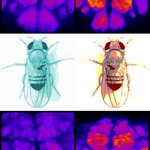
Patients with schizophrenia are able to correctly see through an illusion known as the 'hollow mask' illusion, probably because their brain disconnects 'what the eyes see' from what 'the brain thinks it is seeing', according to a joint UK and German study published in the journal NeuroImage. The findings shed light on why cannabis users may also be less deceived by the illusion whilst on the drug.
People with schizophrenia, a mental illness affecting about one per cent of the population, are known to be immune to certain vision illusions. The latest study confirms that patients with…

